Warning Signs of Colon Cancer in Young Adults
Rising Concern: Colon Cancer’s Alarming Increase in Young Adults and the Critical Importance of Early Detection
Colon cancer, which ranks as the third-most prevalent cancer in the United States, has shown a concerning upward trend among younger individuals over the past two decades. This disease encompasses two distinct types of cancer: colon cancer, which originates in the large intestine, and rectal cancer, which develops specifically in the rectum – the final portion of the large intestine. The increasing prevalence of these cancers in younger populations, including Gen Z and millennials, has become a significant medical concern, leading to a rise in colon cancer cases among young adults. With colon cancer on the rise, it’s crucial to understand why this trend is occurring and how it affects different age groups.
Dr. Derek Ebner, a distinguished gastroenterologist at Mayo Clinic, emphasizes a particularly troubling trend: the rising incidence of colorectal cancer in adults under age 50, with a notable surge in rectal cancer cases. He strongly advocates for increased awareness of colon cancer early symptoms and emphasizes the critical importance of seeking prompt medical attention when symptoms arise, especially for those wondering how common colon cancer is in their 40s, 30s, or even 20s.
“Historically, colorectal cancer showed an equal distribution between colon and rectal cases. However, we’re observing a significant shift in patients with early-onset colorectal cancer – those under age 50 – where rectal cancer rates are disproportionately higher,” explains Dr. Ebner, highlighting this important epidemiological change and addressing why colon cancer is on the rise in young adults.
The rising trend of colon cancer in young adults, particularly rectal cancer, represents a significant shift in disease patterns that healthcare providers are carefully monitoring. This includes an increase in colon cancer in 30s and even colon cancer in 20s, making it essential for younger individuals to be aware of the symptoms and risk factors.

Warning Signs and Symptoms of Colon Cancer
Dr. Ebner has identified four primary warning signs that frequently appear in individuals under 50 who receive colorectal cancer diagnoses. These stage 1 colon cancer symptoms and early signs include:
• Abdominal pain, which may range from mild discomfort to severe cramping
• Diarrhea, especially when persistent or recurring
• Rectal bleeding, whether bright red or darker in color
• Iron deficiency anemia, which can develop gradually
These symptoms of colon cancer in women and men can be subtle at first, but recognizing them early is crucial. Dr. Ebner elaborates that blood loss during bowel movements, even when not visible to the naked eye, can significantly impact iron levels in the body. It’s important to note that colorectal cancer symptoms in females may sometimes differ from those in males, and woman signs of colon cancer in stool should not be ignored.
“When routine blood work reveals iron deficiency, it serves as an important clinical indicator that prompts us to conduct more thorough investigations,” he explains, emphasizing the importance of regular health check-ups and colonoscopies.
He strongly encourages patients to overcome any hesitation about discussing these symptoms, stating, “Despite any potential embarrassment, it’s absolutely crucial to communicate these symptoms to your healthcare provider. This open communication enables proper medical evaluation and can lead to earlier intervention, which often results in more favorable treatment outcomes.”
Understanding how I knew I had colon cancer can be valuable for others. Many patients report changes in bowel habits, persistent abdominal discomfort, or unexplained weight loss as early indicators that prompted them to seek medical attention.
Reducing Risks of Colon Cancer
While complete cancer prevention isn’t possible, implementing specific lifestyle changes can significantly reduce risk factors and enhance overall health outcomes. Understanding what causes colon cancer in females and males is crucial for developing effective prevention strategies.
“Maintaining a healthy lifestyle plays a fundamental role in prevention,” Dr. Ebner emphasizes. “Regular physical activity and following a balanced, nutritious diet can offer protective benefits. However, equally important is remaining vigilant about potential symptoms and understanding the crucial role of regular screening in early detection.”
Screening:
Maintain regular communication with your healthcare providers about appropriate colorectal cancer screening guidelines and options, including colonoscopy. For those with a family history of colorectal cancer or genetic mutations associated with Lynch syndrome or other hereditary cancer syndromes, genetic testing may be recommended.
Exercise:
Incorporate at least 30 minutes of moderate physical activity into your daily routine most days of the week.
Nutrition:
Focus on a diet rich in fresh fruits, vegetables, and whole grains while minimizing processed foods and red meat consumption.
Weight:
Strive to maintain a healthy body weight through balanced nutrition and regular physical activity.
Lifestyle:
Avoid tobacco products completely, and if you consume alcohol, do so in moderation following recommended guidelines.
By understanding the early signs of colon cancer, recognizing the symptoms of colon cancer in women and men, and following these prevention strategies, individuals can take proactive steps to reduce their risk of developing this increasingly common cancer. Remember, early detection through awareness of warning signs and adherence to screening guidelines is key to improving outcomes for colon cancer in young adults.
It’s also important to be aware of signs you don’t have colon cancer, such as temporary changes in bowel habits that resolve quickly or abdominal pain that’s clearly linked to other causes. However, persistent symptoms should always be evaluated by a healthcare professional.
For those diagnosed with advanced disease, understanding metastatic colorectal cancer and the available treatment options is crucial. Stage III and IV colorectal cancer may require more aggressive treatments, including immunotherapy and personalized treatment approaches. In some cases, an ostomy may be necessary as part of the treatment plan.
While the rising incidence of colon cancer in younger adults is concerning, advancements in treatment and early detection methods have led to improved survival rates. By staying informed about the symptoms, risk factors, and screening options, we can work towards reducing the impact of this disease on individuals and communities.
Source:
Deb Balzer (March 14, 2024). Mayo Clinic Minute: Warning signs of colorectal cancer in younger adults. https://newsnetwork.mayoclinic.org/discussion/mayo-clinic-minute-warning-signs-of-colorectal-cancer-in-younger-adults/. Accessed January 7, 2025
You many also like to read:
Blue Zones: Unlocking Longevity Through Lifestyle
How to Prevent Heart Disease: Six Steps to a Healthy Lifestyle
Category
- Health Issues (72)
- Healthy Diet (48)
- Herbs for Health (11)
- Mental Health (33)
- Skin Care (20)

